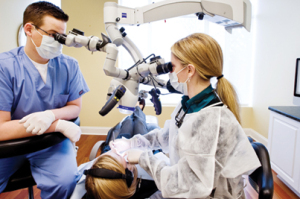Endodontist: Education and Career Information
If you are having severe issues with your teeth and gums, chances are you need to see an endodontist. This career path specializes in the advanced care of teeth and gums. This is a very lucrative position to have and requires extensive education to be successful. It is a well-respected position in the dental field and can be extremely interesting to someone who is fascinated with maintenance of the teeth.
What does an endodontist do?
An endodontist treats the teeth, any diseases or injuries, and the surrounding tissues, concentrating on the pulp, root and teeth. They perform dental surgeries when needed or use endodontic therapy to alleviate the problems. They use state-of-the-art technology in their practices, including digital imaging, operating microscopes, ultrasonic instrumentation and fiber optics. They are experts in administering root canals and other tooth surgeries to fix any underlying issues to save natural teeth. They remove non-restorable and damaged teeth, examine teeth with high-tech instruments, administer anesthesia to limit pain, and fill pulp chambers and canals with various endodontic materials. They also run tests and advise patients on the right course of treatment that will make a definitive impact.
How much does an endodontist earn?
The salary potential for an endodontist is very high. On average, an endodontist makes about $202,000 a year, but that number has the ability to exponentially increase based on the practice, location, experience and education of the endodontist.
What types of skills are needed to be an endodontist?
There are a number of skills needed to be a successful endodontist including:
Ability to build relationships: An endodontist must be able to build relationships that is built on trust with their patients to administer effective treatment plans. They must also build relationships with other staff members who may support them during their patient visits.
Ability to work independently: Many endodontists are in private practice and must be able to work independently in the management and regulation of their offices. They must be able to handle a variety of tasks that will keep things running smoothly.
Attention to detail: There must be a strong emphasis on attention to detail to make sure any surgeries or invasive treatments are correctly administered. An endodontist must be able to accurately read any x-rays or additional information that can assist in the proper diagnosis and administration of treatment.
Knowledge of medicine and dentistry: There must be an advanced knowledge of both medicine and dentistry to be successful in this position.
Management of resources: There will be a number of resources and instruments used in the administration of treatment as well as for managing patient records and information. Being able to manage all of these resources is essential in making sure the practice is effective.
Active listening: An endodontist must be able to listen actively to patients to determine sources of pain and internal feelings and to pinpoint the places that need attention.
Critical thinking: An endodontist must be able to think critically about where the pain may be coming from, different methods of treatment, and what would be the best course of action.
Ability to make sound decisions: Determining the method of treatment, whether invasive or noninvasive, must come with the ability to make clear and sound decisions for the best treatment plans to go forth.
Reading comprehension: Being able to read and understand research, records and other information that will be beneficial in the diagnosis and administration of treatment is key.
Monitoring: Having the ability to monitor patients and their pain before, during and after their treatments and procedures is key in being able to make adjustments when needed.
Internship requirements
Students generally have clinical requirements to complete with supervised, hands-on experience in the final two years of their dental program. Internship hours depend on the scope of work and criteria of the program.
Education requirements
An endodontist must go through a rigorous educational component prior to specialization. The first course of action when attempting to pursue this career path is to obtain a bachelor’s degree. Attending a predentistry program can adequately prepare one for these programs. Once the student has obtained the bachelor’s degree, getting into a dental school is step 2. In order to be accepted to dental school, candidates must pass the Dental Admissions Test, which is a pretest to determine whether or not the candidate will be able to handle the coursework in a dental program.
Coursework that will assist in this career includes anatomy and physiology, physics, biology, biochemistry and different lab techniques. Once someone has gotten into a dental program, that person will have another four years of study to earn the Doctor of Dental Surgery or Doctor of Dental Medicine degree. When someone has graduated from dental school, obtaining the dental license is next. Candidates must pass a written and practical exam from the American Dental Association.
Once the license has been obtained, getting into an endodontist program follows. This is usually an additional two years of coursework to receive the certificate in endodontics and qualifies the candidate for board certification by the American Board of Endodontics. Students who wish to continue their education beyond this point can receive another certificate, a master’s degree in oral and craniofacial science, which enhances the level of education and earning potential.
Every year, continuing education requirements must be fulfilled in order to maintain the educational component of the dental license.
While there is extensive education required to obtain this degree (about 10 years), the outcome both professionally and financially can be well worth the time and effort used to reach this point. If you are interested in working with patients and you are fascinated with the way teeth work and their impact on the rest of the body, a career as an endodontist may be the one for you.






